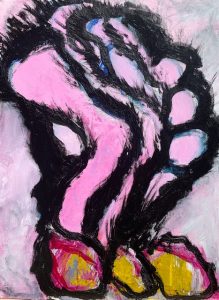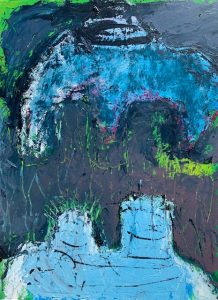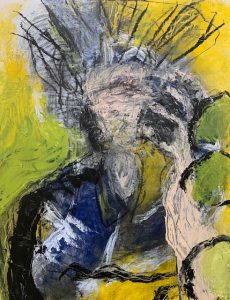

By: Gail Obenreder
“Through some magical process, the inevitable distortion from the act of observation makes its way to the truth.”
Painter Mia Muratori knew that she wanted to be an artist from the time she was six years old. Though she carved out a career on Wall Street, Muratori “always painted or did some form of artwork . . . creating something that is meaningful to myself and others.” Her award-winning oil paintings (many measuring three feet by four feet and done on board) reflect what she sees around her day to day. But rather than seeking realistic depictions, for her, “abstract ideas and universal themes such as duality, opposites, absolutes, and illusion are best represented through abstract art.”
The painter works often in oil and encaustic, though she will utilize a variety of materials and techniques, “whichever tool it takes to journey the chasm between the thoughts and images in my mind to the produced object.” Muratori often takes a thought, an idea, or a philosophical or social construct and seeks to reduce it to “an image, a symbol” that will make it visible, capturing “that which is seen by the third eye, neurological imagery.”
Muratori was born in Germany and grew up in a family of seven in Warrensburg, New York. Pursuing a career in finance, she lived and worked on both the East and West coasts (New York City and Los Angeles). But when she finished that career, and after studying at the Barnes Foundation (Philadelphia) and the Ceramics Institute (Faenza), Muratori moved to the First State and received her MFA degree in 1996 from the University of Delaware.
Since then, her work has been seen in over 30 exhibitions regionally (including Philadelphia’s Gallery 51 and a solo show at Delaware Contemporary), nationally (Brooklyn, Las Vegas, Miami, and Building 98 in Marfa, Texas) and as far afield as the Xi’An University of Art and Architecture in China. Inspired by a range of modern and contemporary painters (David Smith, Milton Avery, Eo Omwake, and Ai WeiWei, among others), Muratori has also taught art at the Delaware Art Museum, Delaware College of Art and Design, and the University of Delaware.



Because her paintings are often large in size, Muratori is challenged as she seeks to increase the scale of her work to “captures thoughts, emotions, zeitgeists.” But she finds a great reward in “recording essences of persons, things, place, space, and time – creating something that is meaningful to myself and others.”
Given the intellectural and philosophical scope with which Muratori works, it’s not surprising to know that she is deeply interested not only in neuroscience and the workings of mind and body, but also in world history, economics, and geopolitical forces – all “the ‘whys’ of the world.”
Muratori’s ability to secure the necessary space in which she could paint was greatly affected during the pandemic, and the Division’s award will help her build a private studio – a “proper space to increase the scale of the work” – as well as to further her recently begun explorations away from abstraction and “working with the figure.” Appreciative of the “thoughtful and knowing criticism received from the juror,” Muratori is honored to be “recognized and appreciated” with this Fellowship that will enable her to continue and deepen her work.
Fellowship Home